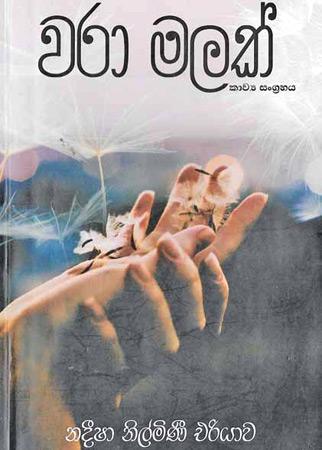
With 55 poems in the Sinhala collection titled Vara Malak (Godage, 2022), Nadeesha Nilmini Eriyawa enters the modern Sinhala poetic scene. To her credit, she has obtained a diploma in communication studies from the Sri Lanka Press Council. She hails from a remote village, Kiriporuwa, in the province of Sabaragamuwa and as a result, her poems emanate a certain degree of so far untouched themes by quite a number of contemporary poets.
 On reading her poems, I felt that certain themes encircle human experiences of poetic persona who seemed to be sandwiched between the rural and the urban cultural conflicts. One example is the poem titled Diyaniyata Liyamanak (a letter to the daughter) where a poetic experience of maternal love is expressed by a rural mother to a daughter who lives in an urban cultural set-up.
On reading her poems, I felt that certain themes encircle human experiences of poetic persona who seemed to be sandwiched between the rural and the urban cultural conflicts. One example is the poem titled Diyaniyata Liyamanak (a letter to the daughter) where a poetic experience of maternal love is expressed by a rural mother to a daughter who lives in an urban cultural set-up.
The mother is suggestive of living in an abode meant for the elderly (mahalu madama). Her letter is reminiscent of a stream of thoughts that run over at least 25 years. The loneliness and the need to express are depicted in a form that captures a certain degree of a painful feeling in the mind of the reader.
Poetic persona
The poem titled Manastapaya (mental grief) is a series of thoughts that spring up in a person, as the day gradually turns into evening darkness. It is a panoramic visualisation of the phases of life of a person who realises that he or she gradually surpasses the turning points in the span of life. The poem titled Kavi Pesa (a bag full of poems) is a sequence of a dream that visualises a collection of poems left in a bag that opens itself for exposure, and is scattered hither and thither.
A discerning reader may have insights into the mind of a creative poet packed with a prolific force of expression.
The recurrent theme of poverty and the spirit of living is innovatively expressed in the poem lifted as Ennata (injection).
The persona in the poem is a youngster who finds several difficulties in his orderly exposure to modern sorts of studies via technology, mainly owing to the conditions and levels of poverty.
But the inner urge of necessity to overcome is seen as the only measure, felt as a compulsive injection. A recurrent theme of the poetess Nadeesha Nilmini is the inner urge of a person as a necessary living force that could be deemed a hero psychologically.
Oriental characteristics
In this direction, the best example is the poem titled Virusita (heroic mind) where the narrator is an incapacitated person who attempts to overcome physical disabilities through the inner strength of the mind.
Quite a number of poems encircle the nuances in the rural family patterns that tend to change.
The title poem given to the collection of poems Vara Malak, I felt, is quite symbolic of the present-day anticipation of the age-old oriental teaching methods.
To feel the pulse of the creativity of the poetess, I render the original in the following lines as follows:
Having seen a vara flower
Floating in the sky
Stretching the hands to it
A murmuring voice sounded
You are like that flower.
Being sensitive to those words
Imprinted in the mind
Like a glistening lotus path
The guardian star uplifted
Step by step to the upper
levels of the sky
Paving the way for the
flower to bloom
Like unto earth found head
positioned to wear a crown step by step the floating flower
Got the chance to ascend high.
As observed by many scholars, poetry is what is lost in the process of translation.
But it is an essential need for the understanding of cross-cultural insights. Perhaps, the collection of Sinhala poems expresses the need. That is my humble feeling.
